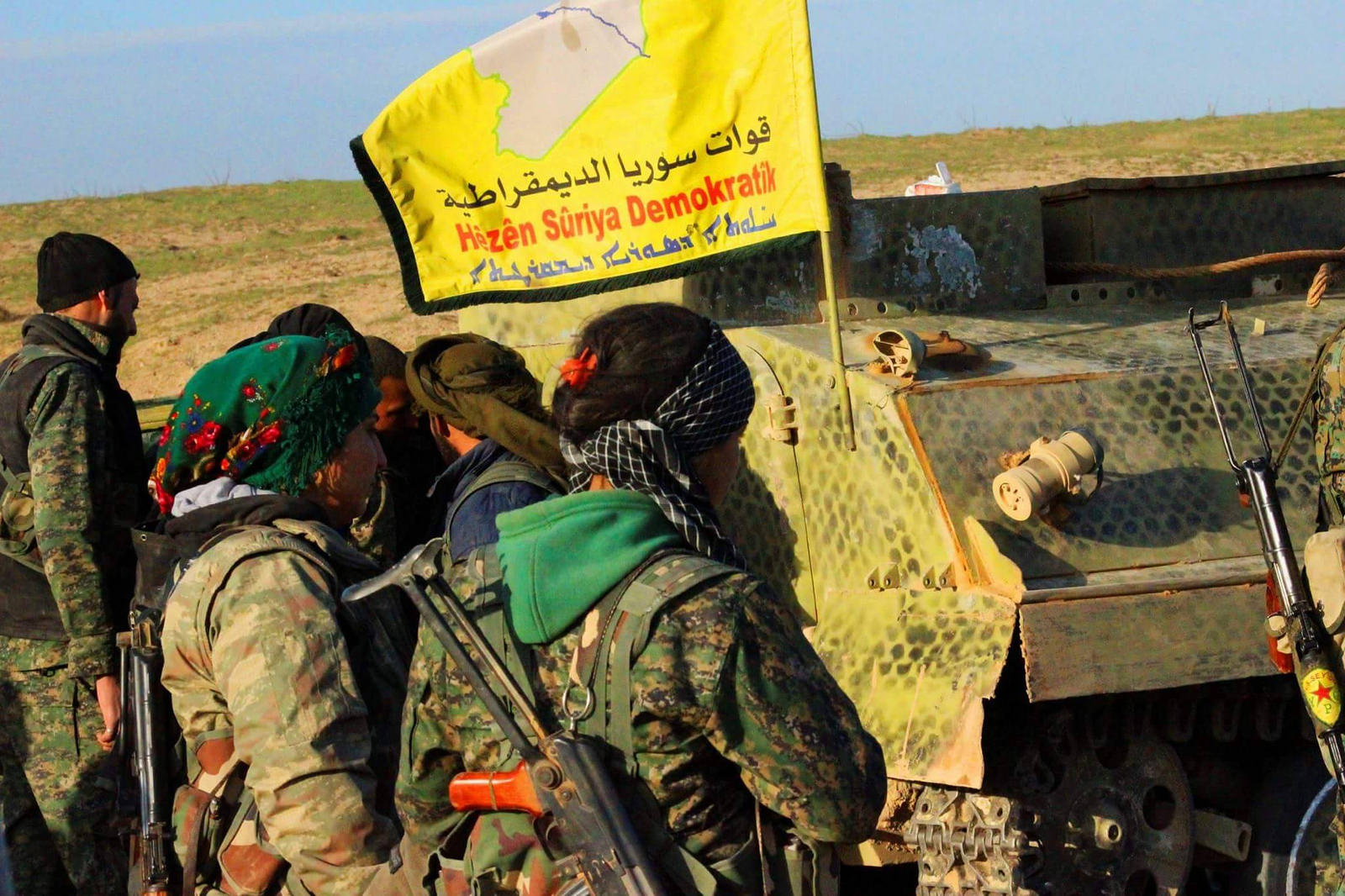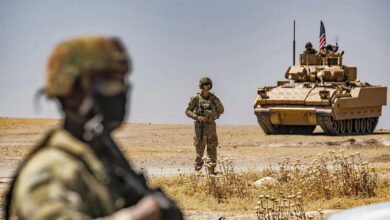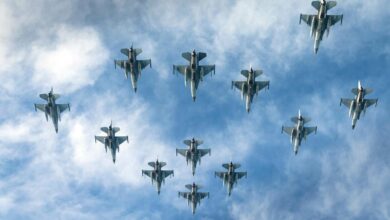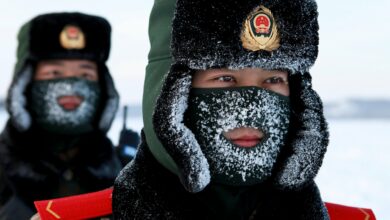After Efrin, Turkey will target all of northern Syria, envoy says
Turkish actions in northern Syria could bring about a war that will engulf the entire country, Sinam Mohamed, foreign representative of the self-ruled democratic administration in the area known by Kurds as Rojava, said on Tuesday.
On Saturday, Turkey launched Operation Olive Branch, conducting attacks against Efrin canton in northern Syria with the help of tanks, heavy artillery and warplanes.
“Now, unfortunately, a new war has opened in the north, in Efrin,” Mohammad said during a roundtable with reporters in Washington, D.C.

She said at present, Efrin is home to 1.2 million people, 400,000 of whom are internally displaced due to the ongoing civil war in Syria. They arrived in the area because it has long been a safe place, but three days ago, with the beginning of the Turkish operation, the situation changed dramatically.
“They are bombing civilian people,” Mohamed said. “Most of the people who have been killed, they are civilians. Some of them, they are from YPG and they are military … [but] they are less.”
“This is a very critical situation,” she added, suggesting that Ankara got the “green light” from Russia to proceed with the attacks.
SDF spokesperson Kino Gabriel said in a statement this week: “We as the Syrian Democratic Forces believe that Turkey would not have dared to bomb our cities and villages and commit massacres against civilians if the Russian Federation had not renounced its moral obligations and given the green light for them to fly in Efrin.”
Turkish President Recep Tayyip Erdogan said on Monday that Turkey and Russia were in agreement about the Efrin operation.
“This war will not be only in Efrin, it will spread everywhere, because we are a part of Syria. Turkey now, they want to make civil war between the Kurds and us,” Mohamed said.
She said Turkey launched the attack because it is seeking “to regain its place in the Middle East.” In addition to Efrin, strikes have been reported in other areas, including Qamishli, and Turkey signaled it may set it sights on Manbij.
On Tuesday, Turkish Foreign Minister Mevlut Cavusoglu said in an interview with France24, “this operation is targeting Afrin region but the threats are also coming from Manbij.”
“We could understand from this that Turkey not only just targeting Efrin. They want to target all the north of Syria, which is not only Kurds,” Mohamed said.
According to the representative, Turkey is against federalism and the democratic system in Syria’s north espoused by the Syrian Kurdish groups it opposes.
The United States has a “moral obligation to protect the democracy in this area, to protect the democratic system in this area,” she said.

Syriac National Council of Syria President Bassam Ishak said during the roundtable that the U.S. is aware of the current situation in Efrin.
“Bombing, it was heard by everybody there, and very close to where American personnel are,” he said.
Mohamed noted that Turkish actions are strengthening ISIS which is still being fought in Syria and in neighboring Iraq.
“Turkey, in this war, will create more radical groups to come out and threatening all over the world,” she said, arguing that there was no difference between Turkish and ISIS attacks, since both resulted in civilian deaths.
The representative underscored that the same forces that defeated ISIS in Syria – the Syrian Democratic Forces, the bulk of which is made of the YPG – are now being attacked by a NATO member Turkey. She called for a “clear attitude” from the international community regarding the situation.
“Erdogan will not listen to anybody … but he is a member of NATO. United States can stop him as a member of NATO,” Mohamed said.
She also argued that the Geneva talks won’t help resolve the Syrian crisis because they don’t include representatives of all Syrian people and from the north in particular. Neither the SDF or their political representatives, which control a significant portion of northern Syria, have been invited to Geneva.
Mohamed said they were invited to participate in negotiations in Sochi scheduled for next week, but will not attend.
“For Sochi … no solution will be there. The Turkish attack is there for Efrin, how could we solve the problem? We have to stop this and then we can maybe make something.”
Timing of the attack on Efrin
The situation in Efrin escalated as Russia withdrew its troops from the area. The Russian Ministry of Defence said in a statement that the Russian Military Police relocated to Tel Ajar to prevent provocations and threats to the lives of Russian servicemen.
Ishak argued that Moscow was trying to carry out “political extortion” prior to the Turkish attack: the area would be protected if were back under the control of Syrian President Bashar Assad.
Aldar Xelil, co-president of the executive body of northern Syria’s Movement for a Democratic Society (TEV DEM) said that in a Friday meeting, Russia asked the Efrin administration to hand over part of its territory to the Syrian regime in return for preventing the Turkish attack on Efrin. Xelil said the offer was refused.
“They wanted to give Efrin to the regime,” Ishak said, noting that one day before the military operation started, the regime claimed it was going to defend the airspace of the canton. “This did not materialize. Because it is related actually to Russia.”

Russia has previously stated that it was plans by the U.S.-led Coalition to create a border security force in Syria that provoked Turkey. Since the details regarding the BSF have become public, Washington has changed its rhetoric saying that there was a misunderstanding and the force is not a new development.
Mohamad said the situation was misunderstood.
“It is restructuring,” she said, noting that the force has already been active in Syria. “Because of the situation with ISIS – ISIS is coming through border sometimes – they wanted to protect this front. This is the aim of it.”
“It is not a new force being established,” she underscored. “Turkey is always seeking for excuses.
Ishak said that after Raqqa offensive was over, Turkey was hoping the U.S. would slowly disengage from the region. However, U.S. Secretary of State Rex Tillerson announced last week that Washington had no plans to leave the area and is moving from a military to a diplomatic phase.
“They [Turkey] hoped the U.S. was using us militarily against ISIS, and we would not have any political role. So I think this has also played a role,” Ishak said.
He noted that the U.S. can play a positive role in the situation through dialogue and give Turkey assurances.
“This is where U.S. can be more effective than Russia,” he added.
Turkey’s Kurdish Problem
Ankara has stated that the goal of Operation Olive Branch is to “neutralize the terrorists belonging to PKK/KCK/PYD-YPG,” as well as Islamic State in northwestern Syria. However, there is no known ISIS presence in the area.
Turkey views the predominantly-Kurdish People’s Protection Unit (YPG), which makes up the backbone of the Syrian Democratic Forces and its linked Democratic Union Party (PYD) and the Kurdistan Communities Union (KCK) umbrella group as extensions of Turkey’s Kurdistan Workers’ Party (PKK), which has fought a decades-long insurgency mainly in Turkey’s majority-Kurdish southwest.
The PKK is a designated terror group in Turkey and the U.S. but the YPG is not, and remains one of the main Coalition partners fighting ISIS in Syria.
“PYD is a political party in Syria. Not even one member of them [is] from PKK. They are struggling in Syria,” Mohamed said. “We have nothing to do against Turkey. We always say we would like to have a good relationship.”
Ishak said Turkey has an internal problem with its Kurdish population and is trying to force people in Syria to address the Kurdish question “like they want.”
“We don’t want … anybody to tell us how to solve it. Syrians should have the choice on how we solve our problems with the Kurds, with the Syriacs, with everybody else,” he said.












